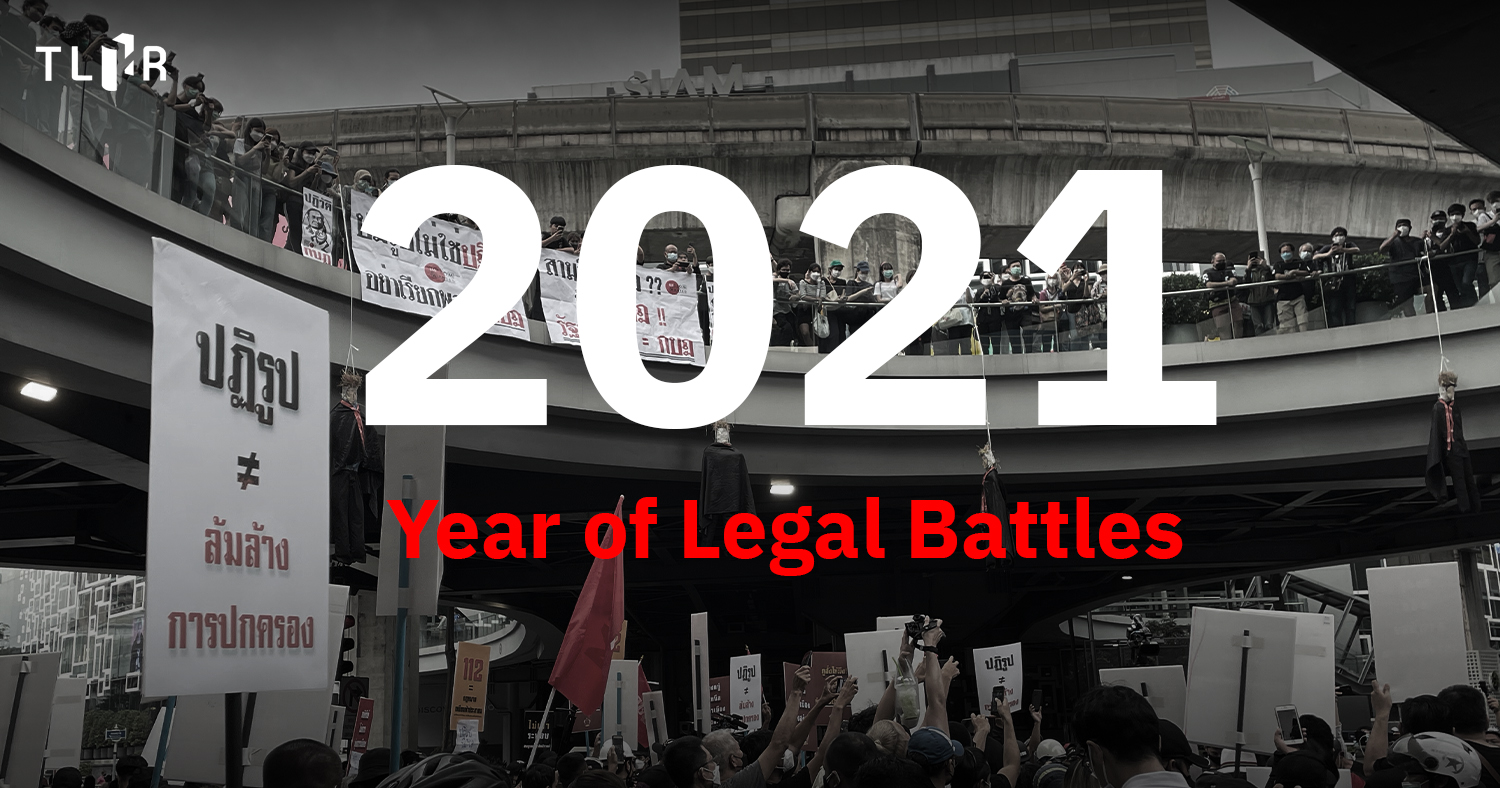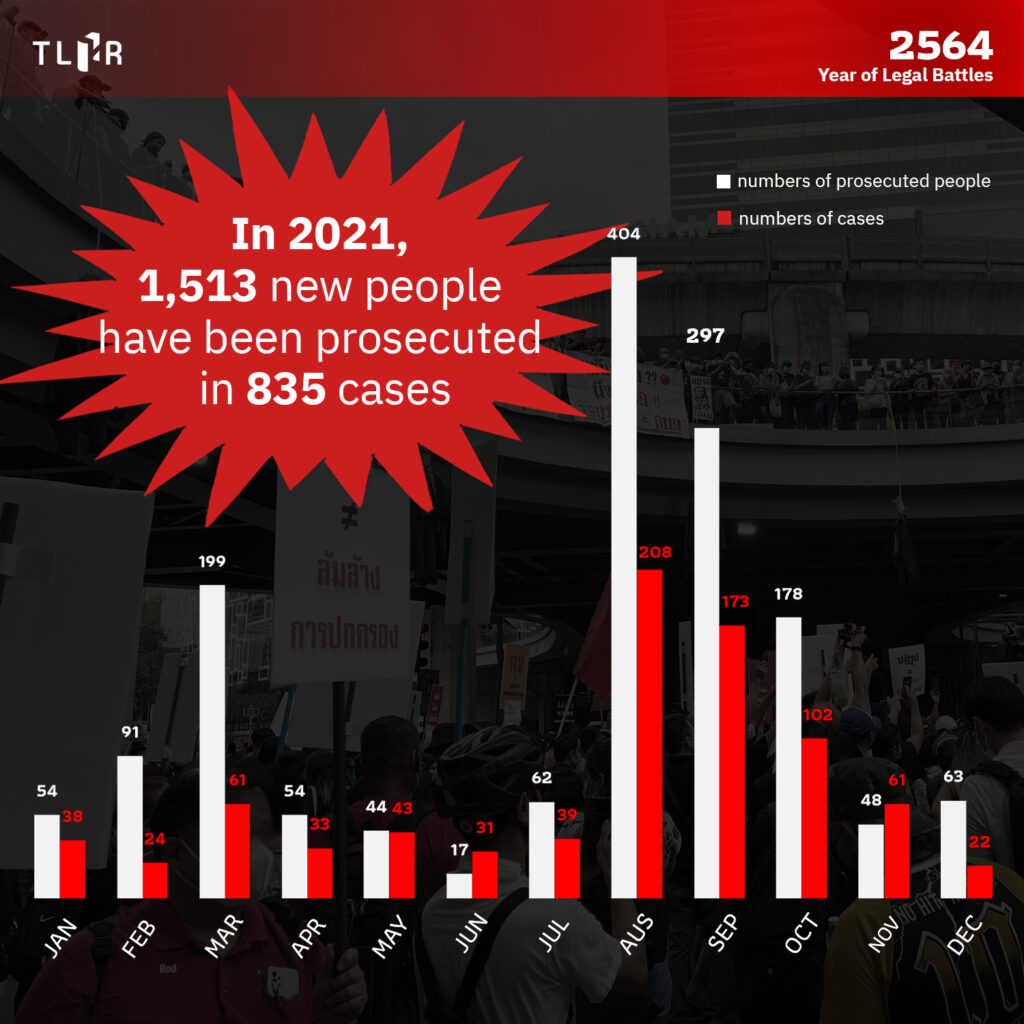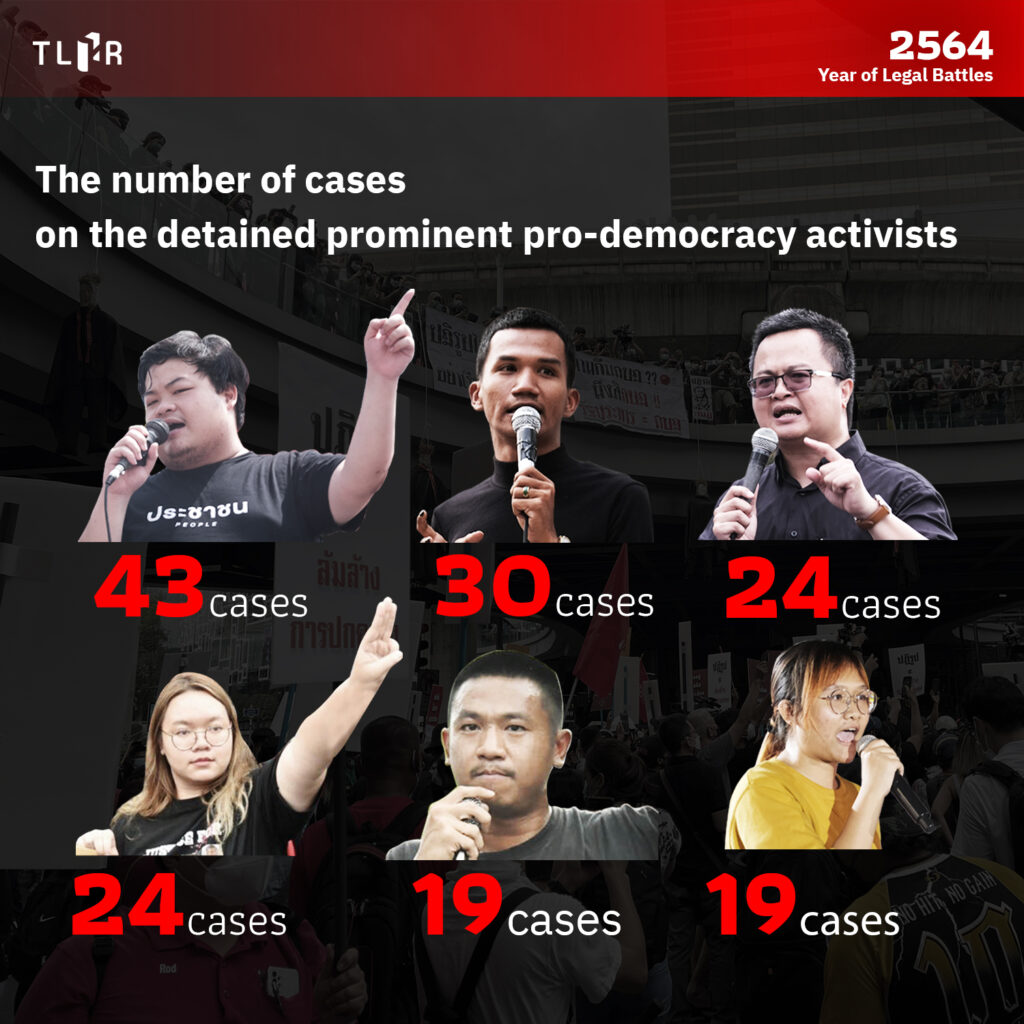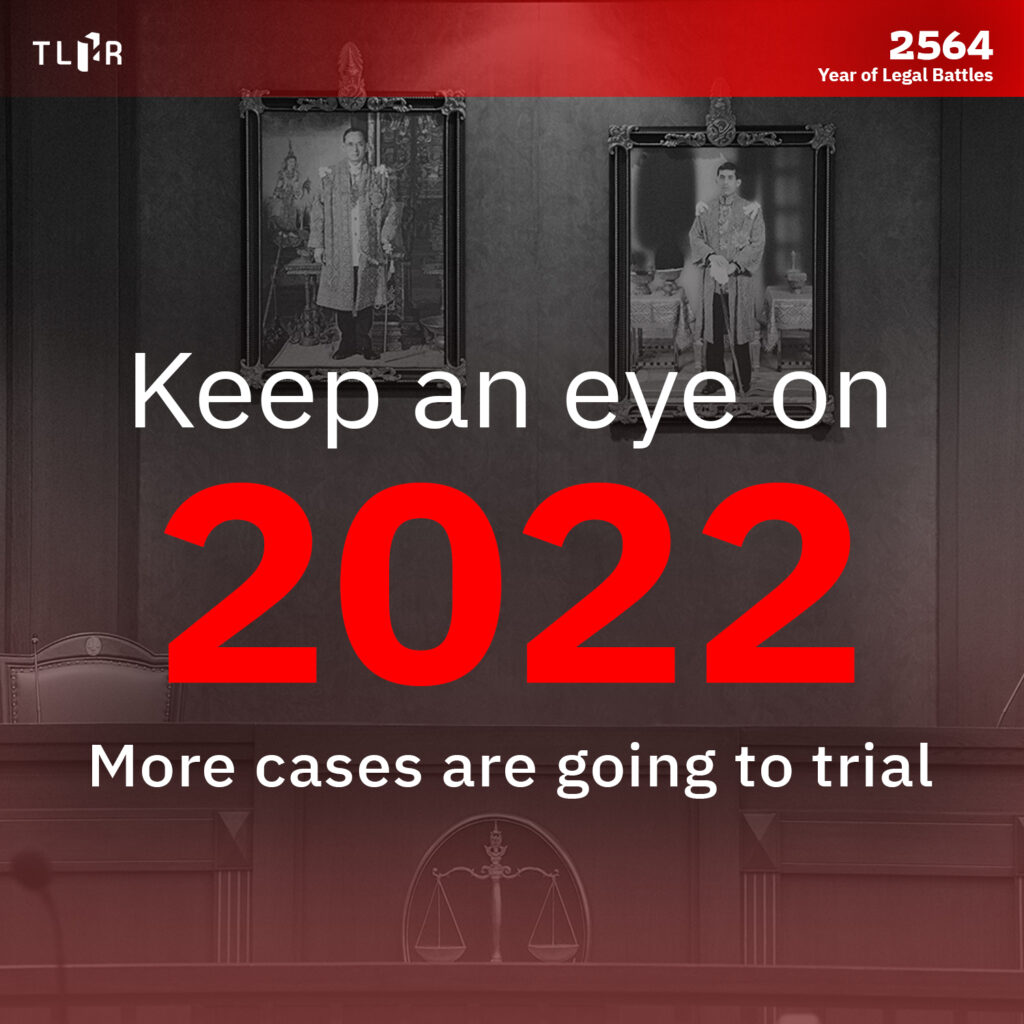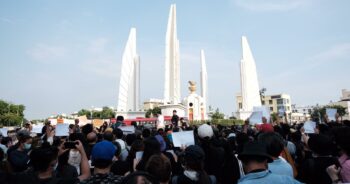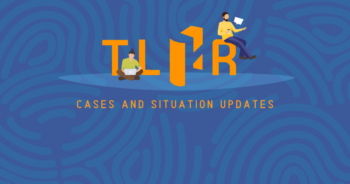If 2020 was the year of protests and breaking ceiling, as a renewed and intense, thematically as well as numerically speaking, wave of pro-democracy protests led by the new generation managed to break through the political ceiling, 2021 then is the year of “state’s retaliation” manifested through heavy suppression of protesters and active citizens. In particular, “laws” and “justice system” have become a political tool to arrest key leaders, accuse and impose legal burdens on activists, and instill fear among general citizens.
Amidst the protests that had continued from the year before, the prosecution of protesters and political expression followed suit throughout 2021. However, its extent was unprecedented in Thai political history.
According to TLHR observation, at least 1,747 people in 980 cases have been prosecuted due to political protests and expression since the Free Youth Rally on 18 July 2020 until 25 December 2021.
Out of all cases, 150 have already been concluded. Most were settled through fines by police or court. At least 830 other cases are still currently under various processes.
Geographically speaking, Bangkok and vicinity has 785 cases, the Central and Eastern Region combined have 22 cases, the Northern Region has 73 cases, the Northeastern Region has 70 cases, and the Southern Region has 30 cases.
If people accused in multiple cases are counted more than once, the prosecution will have taken place as many as 3,325 times.
1,513 people in 835 cases were prosecuted in 2021 alone
Looking at 2021 specifically, it was found that 1,513 new people in 835 cases have been politically accused, accounting for an almost 7-fold increase compared to the number in the second half of 2020.
The above figures demonstrates that slightly over 4 people subject to political accusation or around 2 new political cases per day in the past year. It also means that at least 2 – 3 police stations would have to process political accusations of citizens each day. This calculation does not take into account the ongoing cases in various stages of the justice system.
The monthly statistics of people who have been prosecuted for the first time in 2021 are as follows:
January – at least 54 new people in 38 cases were prosecuted.
February – at least 91 new people in 24 cases were prosecuted.
March – at least 199 new people in 61 cases were prosecuted.
April – at least 54 new people in 33 cases were prosecuted.
May – at least 44 new people in 43 cases were prosecuted.
June – at least 17 new people in 31 cases were prosecuted.
July – at least 62 new people in 39 cases were prosecuted.
August – at least 404 new people in 208 cases were prosecuted.
September – at least 297 new people in 173 cases were prosecuted.
October – at least 178 new people in 102 cases were prosecuted.
November – at least 48 new people in 61 cases were prosecuted.
December – at least 63 new people in 22 cases were prosecuted (up until 25 December 2021)
Notably, the number of cases rose sharply during the three-month period between August to October. The period coincided with a heightened political tension as a result of car mob events in various provinces, almost daily protests by various groups in Bangkok, and series of “Talu-Gas” protests at Din Daeng Intersection and the surrounding areas.
Emergency Decree and Section 112 cases soared over the course of one year
Looking at the 2021 case statistics by the charges, especially the three most important ones, used to accuse politically active citizens, we have found that:
Charge of the violation of the Emergency Decree was used on at least 1,244 new people in 543 cases.
Charge under Section 112 of the Penal Code was used on at least 127 new people in 104 cases.
Charge under Section 116 of the Penal Code was used on at least 55 new people in 16 cases.
The extension of the declaration of an emergency situation at least until the beginning of 2022 means the continuation of the Emergency Decree. That, together with a relentless use of the lese majeste law, will be the major point of focus in the “legal battles” next year.
The number of cases on the detained prominent pro-democracy activists
As far as the key political leaders accused between 18 July 2020 and 25 December 2021 are concerned, we have found that:
Parit “Penguin” Chiwarak has in 43 cases.
Panupong “Mike” Jadnok has 30 cases.
Anon Nampa has 24 cases.
Panusaya “Rung” Sithijirawattanakul has 24 cases.
Jatupat “Pai” Boonpattararaksa has 19 cases.
Benja Apan has 19 cases.
Meanwhile, a large number of other activists in Bangkok and other provinces also faced prosecution due to their political participation and expression as well. These lawsuits have created burdens in terms of time, travel, expenses, and other costs, and are considered a significant hurdle to the political movement in the subsequent years. Moreover, the fact that a considerable portion of public resources was used on these procedures presents an important issue as well.
In addition to the cases after the Free Youth rally as mentioned above, there are still many other political activists whose ongoing cases took place before July 2020 or were initiated during the NCPO era. Some of them are still going to trials to this day.
Keep an eye on 2022: more cases are going to trial
We have identified some important patterns in the judicial process in 2021. For instance, public prosecutor decided not to indict cases of the violation of the Emergency Decree from political protests (namely 5 cases, as far as we are aware) because public prosecutor held that the protests did not cause Covid-19 transmission and public disorder. The court dismissed ‘Mind’ Patsaravalee’s case of the violation of the Emergency Decree during the serious emergency situation. The court dismissed the Section 112 allegation in the case of a student from Chantaburi province who posted a comment criticizing the sufficiency economy. These patterns, however, only represent a small fraction compared to the whole picture.
The prevailing tendency of the political prosecution has been almost 100% indictment without adequate screening at the police stage where cases were initiated, which was within the direct mandate of the executive (government).
Out of almost one thousand political cases, at least 233 cases have been indicted, especially the Section 112 cases that were continuously forwarded to the court in the latter half of 2021. As a result, dates for witness examination will be set and verdicts will come out in the coming year. These number have not even included cases awaiting indictment or new cases arising from future political events yet.
As such, court litigation is likely to become an important “scene” for the struggles in the subsequent years, as activists and citizens are heading there to defend themselves while advancing their political agenda in parallel.
At the end of the day, Thai society will need to consider a comprehensive reform of its entire justice system, including the judiciary, police, public prosecutor, and Department of Corrections. These are the areas where an array of problems has been identified on the state’s side in this “legal battle”.
—————————
Note: the abovementioned statistics compile all known cases related to political expression and protest, not only those receiving legal aid from the TLHR.
